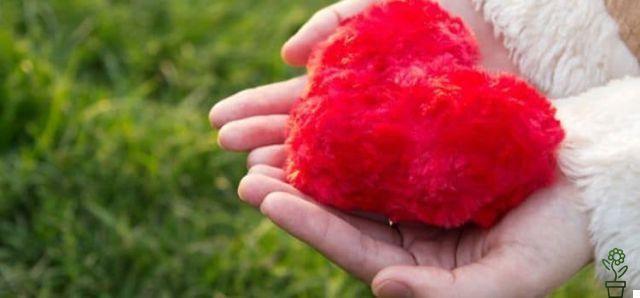What is love? Through the words of Fromm, in his The art of loving, I want to help you understand it and discover that loving is something we learn to do:
- What is love? The only solution to the problem of human existence.
- When I don't love you but I say I love you.
- Love is the child of freedom.
- The most basic form of love.
- The art of loving: how to learn to really love.
If you know what love is you have the power to change your life, and you'll also find out if Fromm's book is worth your time and money.
Ready, ready, for this journey to (re) discover love?
Great, because let's get started right away!
What is love? The only solution to the problem of human existence

What is love?
Some say it is a feeling, an emotion.
Others like to see it as a principle, a universal value, which everyone recognizes.
Love, for others, is just an illusion, something abstract that doesn't exist.
For many, love is a relationship.
In short, is it possible to arrive at a definition of love, or at least to understand what it really is?
For Erich Fromm, love is the only valid solution to the problem of human existence.
I would not want to spoil your reading of the book, since these words are written right on the last page of
The art of loving.
But I think it cannot be understood how great is love without reflecting on this conclusion.
But love, for Fromm, has specific characteristics.
First of all for him love is action.
Are you capable of loving?
I don't want to provoke you, but to make you think with a test that takes a few minutes and answers this very question.
It will allow you to understand if in this moment of your life you have the ability to truly love (especially who you say you love).
Start quiz Continue Complete the form below to see the results Leave your name and email to subscribe to my newsletter and receive the test results. Your name: Your email: I consent to the processing of my data in compliance with the privacy regulations. Show results
By the way he writes:
[…] Love is an action, a human power that can only be practiced in freedom and is not the consequence of a constraint. […] Love is above all “giving”.
Actually try to think of everything you would call love.
- The physical presence of the people who love you when they are close to you and transmit their affection to you.
- The understanding of who believes in you and accepts you for who, or what, you are.
- The respect you receive from those who don't want to change you, but leave you free, or free, to be whatever you want.
- The trust of those who choose you for who you are, not for what you do.
Love is therefore action, something that is done, that we do, that you do.
By the way, it is essential to understand what it means to love, because if love is action, then I am the actions of love what should interest you ..
Not only that, because love, continues Fromm, precisely because it is something you do, it's a choice.
Loving someone is not just a strong feeling, it is a choice, a promise, a commitment. […] Love is essentially an act of will.
I fully share this thought.
But to many it may seem absurd to think that love is a choice and not something that happens to us and we cannot control.
Let's try a list of the things you do for love, so you understand it better.
- Sincere listening.
- Forgive mistakes and mistakes.
- Respect for different ideas and opinions that you don't quite share.
- Support and encouragement in the face of difficulties.
- Time, availability.
- Your physical presence, but above all emotional, psychological.
- The trust you give and make people feel.
- Your help, whether it's a small favor or a big gift.
These are just some of the actions you take when you love someone.
They seem to you random?
In the sense that you do them without wanting to?
Of course, you only do them to some people you love and not to everyone, but we'll talk about this shortly.
Now just answer this question: Are these things you do by chance and against your will?
On the other hand, does it seem credible to you that forgiveness, understanding, help, support, availability are things that happen to you?
- Don't you choose to help someone out of no interest, except to help them out?
- Or if you have forgiven a friend who made a mistake with you, have you not chosen him?
- Or is the respect you give to others something that happens to you, or is it your decision?
As you see love is really a choice, because to love means to act, it is a way of living, of behaving and these are all things that depend on your will.
Yet, we usually experience it and feel it differently.
Earlier I mentioned that we usually choose these actions for a few people.
The problem, according to Fromm, is having confused love with something else.
He defines them as forms of pseudo love.
Basically I say I love you, but in reality I'm not really loving you.
Not that people realize it, we don't realize that we have fallen into these mistakes.
We are sincerely convinced that we love, but we are wrong.
Are you a selfish person?
Answer the 7 questions in my selfishness test.
It will allow you to understand if (and to what extent) you are a selfish person.Start quiz Continue Complete the form below to see the results Leave your name and email to subscribe to my newsletter and receive the test result. Your name: Your email: I consent to the processing of my data in compliance with the privacy regulations. Show results
When I don't love you but I say I love you

What movies, novels and all of us think is great love, Fromm calls it an idolatrous love.
[...] the loved one is adored as a supreme being, the one who gives love, light, happiness. [...] Since usually no one can, in the long run, live in the adoration of the other, disappointment is fatal, and as a remedy it is look for another idol and become an endless chain.
This happens every time we place our life in someone's hands.
Am I exaggerating?
It happens every time you think, without telling anyone, something like this:
- Without this person I would not be able to live.
- Without her, or him, my life wouldn't make sense.
- If I lose it, or if I lose it, I would no longer want to get up in the morning.
- Without her, or him, I would never be happy again.
And many others like it, where the juice is always the same: I am happy because you are here, you are my happiness and you give meaning to my life.
If I think you will make me happy, give me love and change my life, I will demand that you do.
Then I'll ask you to be kind, courteous, present, passionate, or passionate, sweet, strong, well, I will want to be perfect next to me.
Perfect in the sense that it gives me everything I need to be happy.
- Love.
- Happiness.
- Safety.
- Feeling important.
- Feel special.
And many other things!
What happens when people they are not what you expect?
What happens if they don't give you what you think is right, act like you think is wrong?
Be disappointed, or disappointed.
This is inevitable: if my life, that is my joy and my happiness, depends on you, you must be able to give me everything I want.
Always, every day.
When that doesn't happen, I am disappointed and thinking that the fault is yours, I will seek this happiness and what I desire elsewhere.
I will think you are the problem, and I have to find someone better than you to regain joy and happiness.
Here's what Fromm adds:
[…] While it should demonstrate the intensity and depth of feeling (the strength of the attraction we feel for each other), it often reveals hunger and despair […].
In practice, the transport you feel for someone is more than love the dimension of the fear of suffering that you feel.
The more you believe that a person can make you happy and take away that fear, that suffering, the more it attracts you.
Almost always a couple crisis arises from unmet needs, not from love.
The problem is not that we are not loved, but that we are not satisfied as we wish.
You want something you don't get, go into crisis and you are looking for someone who knows how to give you what you want.
Love? Or personal interest?
By the way I want to advise you to read a rich resource on eternal love, which I wrote to explain that it is possible, as long as understand what love is.
I remind you: action and choice.
But Fromm continues, explaining what is often hidden under the name "love".
Love as mutual satisfaction and love as "cooperation", as a refuge from loneliness, are the two "normal" forms of disintegration of love […].
What does it mean?
That according to Fromm our relations they are often an escape from loneliness and suffering.
We are afraid of being alone, of not having someone around, of not having support.
We are afraid of suffering and feeling bad, of being unhappy, and often others are a lifeline, a need.
The problem is to think that it is others who can make us happy, and therefore to seek this happiness in them.
I say it is a problem for two reasons.
The first is that this is how we end up depend on them and use them to get what we want.
I'm not with you because I love you, I'm with you because you give me something I need.
It seems normal, but it means that I will stay with you not because I love you, but as long as you keep giving me what I want.
The second reason, in case this isn't down enough, is that no one can make you happy.
Do you face puzzled?
First read what happiness is, so you begin to understand what I'm telling you.
Then you absolutely have to find out what emotional independence is, and understand how you are the one, or the only, responsible for your emotions.
In addition, our relationships often become a simple exchange:
- You give me love, I'm close to you.
- You give me understanding and I respect you.
- You make me feel safe and I help you if you need it.
- You keep me company and I bring you pleasure.
In short, a barter for which we sell our love, that is actions, behaviors and gestures we talked about earlier, in exchange for what interests us.
If we were at the market there would be no problem, but here we would be talking about love.
What is love, an exchange? The satisfaction of a need?
When you can't live without a person, Is it because you love it, or because you need it?
Why do you want her happiness or do you expect me to make you happy?
In fact, we often confuse love for others with the need for them to give us love and make us happy.
As mentioned, if I need you to feel good I don't love you, in the sense that I don't leave you free, or free.
Freedom, Fromm argued, is the basis of love, the mother from which it derives.
The key point that allows us not to fall into the error of using others instead of loving them.
Does it make sense to continue your relationship as a couple?
Answer my test questions to find out.
It will allow you to understand if your relationship has the characteristics to last or not.
Love is the child of freedom

The fundamental element of love, according to Fromm, is respect, that is the ability to see others for who they are.
In essence, it means wanting others to grow up for who they are, without me being able to control their choices or their actions.
[…] Respect is only possible if I have achieved independence, if I can stand or walk without the need for crutches, without having to dominate or exploit another person.
Here's what love is: the freedom to let others be who they want to be.
But if I need your love, and you don't give it to me, will I set you free, or free?
I can not do that, because I need something that you have to give me.
When we live our relationships with the idea that others should make us feel good, make us happy or give us love, we always end up demanding all this.
And when there is a demand, you can no longer love.
The problem, therefore, is that we think that others must give us something, because we live love as if it were an object.
[…] The supposition that the problem of love is the problem of an object and not the problem of a faculty.
That's right, we live love thinking that is something that others have to give us.
You want to be loved, or loved, more than to love.
Your problem, if you think about it, is not to love, but receive love.
You want something from others.
[…] Most people believe that love means "to be loved", rather than to love; […] The problem is how to make oneself loved, how to make oneself lovable […].
How do you live love?
- If you're single, aren't you looking for someone to love you?
- Is your problem someone to love, or someone to give you love?
- And if you are in a relationship, is your problem loving or receiving this love every day?
- What scares you, that you will not be able to love tomorrow and that you will no longer receive love from those around you tomorrow?
Or you think: “I have to find someone to love, it doesn't matter if they will love me!”.
I don't think you can think of something like this.
I want to show you a video from a movie that talks about just that, because when I first heard it I thought "that's what love is!"
Don't be fooled by the movie characters (Brother Sun and Sister Moon by Franco Zeffirelli).
The words that Chiara says are not those of a "saint" or a "religious", but of a person who has understood that love is essentially giving.
Then we can find a thousand ways and a thousand forms, but only when you stop demanding something and start giving, you are really loving.
Soon we will also see it much better.
Try to question your certainties and think that perhaps, until now, you did not understand what love was, simply thinking of it as something to achieve, a person to meet.
What Fromm says is very important.
We don't care about loving, we just want to be loved.
For this, love becomes an exchange.
You want to receive love, so you look for something that others can accept in return.
It's bartering, but I wouldn't call it love.
The problem is, if you had to choose, you would never want to receive this kind of love.
You don't want a person who loves you because you are sympathetic or skilled at work or intelligent.
You want a person who loves you, just as you are, that you do not want to change you, that you respect every choice, decision, behavior.
Do you want a person who gives you love anyway, or who only gives it to you if you do as he says?
If the phrases you heard in the video were told by the person next to you, talking about you, what would you think?
- If your child tells you he will love you though you will treat him badly
- If a friend of yours tells you that he will always be close to you though you will betray him.
- If your partner tells you that he will still love you, though you will try to hurt him.
You would think it crazy, perhaps, but you would also think the most important thing: who really loves you.
These would be true love phrases.
I wrote what unconditional love is, and chose two other videos that will make you think and perhaps move.
You will realize that that's what you really want.
For Fromm, love is not simply a relationship, but an attitude, a way of being that cannot become exclusive to a few, lucky people.
Here we are.
The most basic form of love

If a person but only another person, and is indifferent towards his fellow men, his is not love […].
This phrase probably sounds strange.
You think you love your partner, maybe your parents, some relatives and few friends.
Almost certainly everyone else they are indifferent to you and maybe someone can't even stand it.
Fromm says yours is not love, because you say you love only a few and you ignore the others completely.
Was he wrong?
Here's what it claims:
[…] If I have developed the ability to love, I cannot help but love my brothers.
Think about it for a moment: is that why you love some people while all the other millions are indifferent to you?
As seen before, you may believe, because everyone thinks so, that you don't choose who you love.
Or maybe we are wrong?
I believe there is only one reason: from these few people you expect more.
You expect something.
You pretend to be loved, or loved, that they make you happy, that they make you feel good.
Obviously these are not things you expect from me, for example, or from a stranger you meet on the bus, or see on the street.
The problem is that you, instead of loving, you think about receiving love, respect, understanding.
At the center of your interest is not love, your ability to love, but only what others will give you.
But Fromm argues that this is not love.
He says love is giving, but if you live like this, choosing a lucky few, you do not do it for love, but for convenience.
She talks about maternal love as an example of unconditional love, but argues that a mother isn't necessarily capable of loving her child.
It is only as long as be ready to part with him, because as it grows it will take its own path, perhaps differently.
And even after separation, continue to love.
To love though.
If the people you say you love leave you or forever deny you love, kindness, respect, Would you still love them?
You love them because you want to love them, for who they are and for their choices, or do you love them because you want to receive something?
And if they don't give it to you, you stop giving too?
This is a fundamental question, because without this awareness, you don't love and you will never be happy.
[…] “Deserved” love can leave a sense of bitterness because one is not loved for oneself, but one is loved only because one likes it; ultimately, one feels not loved, but useful.
Do you understand the profound difference?
I dare more: those who say they love you for one reason or another, because you are as they would like you to be, actually does not love you at all.
Utility means that I need you to satisfy a need.
If I need you, I can't love you.
I've explained this to you before, offering you some resources that you absolutely must read.
But now I have another, fundamental one to show you.
I've written a guide that tells you how to be happy whatever happens.
By reading it you will understand that expecting something, anything from others, will always make you unhappy.
You will realize the difference between love and need.
So here's what love is: a skill, a choice, an art, which can always be learned.
Something you give as a way of being, not a few, not to get something in return.
Love is therefore a gift, your way of life.
The art of loving: how to learn to really love

Teaching to love, in this I agree with Fromm, is not possible.
Love is an art you can learn in one way: loving in first person.
You have to act with love to learn to love, and the advice you are about to read serves to give you indications on how to do it, on what you need.
First of all Fromm considers the discipline.
You must want to learn to love and make it an important activity in your life.
Not something you happen to do when you're in the mood, but something you choose to do, every day.
Then the concentration.
Thinking about love, focusing on what you are doing, eliminating distractions that can only distract you from the art you want to learn.
Then there is the patience.
Learning to love takes time, practice, and the desire not to stop at the first difficulties.
Often the problem is living our life in a hurry, as if we never have enough time for everything.
Modern man thinks he loses something - time - when he doesn't rush things; yet he doesn't know what to do with the time he earns, except kill it.
In fact, we often run like crazy and when we save time from our commitments, we look for a way to get it through!
Finally it is essential the ability to be alone, to learn to live well in solitude.
If you can't be alone, or alone, you will end up seek others not to love them, but to escape from loneliness, together with them.
As we said before, an escape from suffering, certainly not a choice of love.
I have created a guide to suggest how loving yourself is possible.
By reading it you will have many ideas to work on in your relationship with yourself, or yourself.
Including this, you just have to start loving to give respect and trust to those you love.
As said love it is not exclusive to a few, but an attitude that you have to develop, a way of life.
Just as the rain wets everyone, you too, if you love, love everyone.
Because to love means to give, to be open and available, and this becomes a way you relate to the world, not to some people.
Becomes your way of being, your nature.
The beauty is that then you realize that if you want to feel good and be happy, you don't need to be loved, or loved.
Did you read that right? Yup.
You don't need to be loved, or loved.
I suggest you find out how to know yourself by taking a cue from another book, Message for an eagle that thinks itself a chicken, which will make your eyes go wide.
Book that I recommend, of course, to read together with the art of loving.
Since you do not need to receive love, to be happy, but to love, learning to do so becomes, or at least should, your priority.
And loving each other is an integral part of the process.
You should get up every morning and think about love, consider it the most important thing in the world.
Imagine leaving the house and meet Chiara who runs towards you, as in the video.
You look at each other, you hug each other, you say his own words and then you start your day by giving everything to whoever you meet.
Would you be the happiest person in the world and nothing could harm you.
Think about it: the happiest person in the world.
And it doesn't depend on anyone but you.
You could start today, now, and you would be the happiest person in the world.
I therefore suggest you read my guide on how to learn to love, because you will find many tips to start making this fundamental choice in your life.
Discover the 5 Steps to Living INTENSIVELY a life Full of Emotions and Find You Well and in Balance in Every Situation (without Feeling Bad anymore) Training Your "Emotional Independence”, Even If You Don't Believe That Things Enough May they Be Different ...
... If You Don't Trust Yours Capacity or Yours Character It Doesn't Help You!
Conclusions
Today we understood what love is: an art, a choice, an attitude, the only valid answer to the problem of human existence.
If indeed, as they often convince us, love were casual and fortuitous, it would no longer exist for a long time.
Actually love it lives in people who choose to give it even in the face of difficulties, challenges, problems.
Here's what I learned:
- The love it is not simply an emotion, but a choice dictated by our will to give to others.
- Love is never an exclusive matter. Love is unconditional, it is not deserved and it is universal.
- We often confuse the need of others, the belief that they can make us happy, with love, ending up demanding something rather than giving.
- We usually confuse love with being loved, experiencing it as an object that we must seek, find, obtain and preserve as much as possible.
- Learning the art of loving requires discipline, patience, concentration, but above all concrete action, the will to act with love, always and in any case.
I think the Art of Love is one of the most interesting books written about love.
Without doubt one of my favorites.
Reading it allowed me to question what our culture offers us, to reflect.
I admit I don't agree with everything Fromm claims, but he wouldn't agree with everything I said either 😉
I certainly couldn't exhaust the beauty and depth of this book in this resource, I just wanted to start from his thoughts to explain what love is.


























